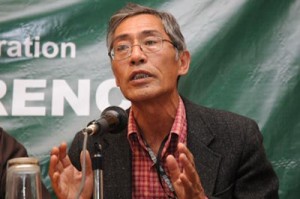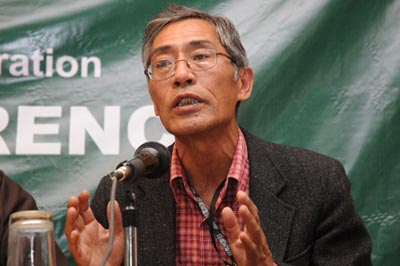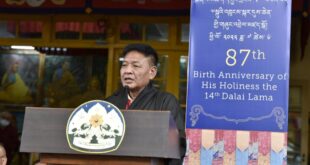By Thubten Samphel
The Huffington Post
May 20, 2014
During a visit this week to the Tibetan countryside of Dechen in Yunnan, Yu Zhengsheng, a member of the standing committee of the Politburo of the Chinese Communist Party and chairman of China’s top advisory body, assured Tibetan Buddhist leaders that the party would fully implement its policy to ensure religious freedom.
We don’t know whether Tibetans buy into such assurances. But we are certain that the majority of Chinese intellectuals who express an opinion on China’s minority policy are not happy with such assurances. In fact, they are busy overturning China’s current minority policy. As far as its minority policy is concerned, China is going through a Hundred -Flowers moment.

Recommendations to changes in China’s minority policy are blooming like so many flowers under a clear sky. Once the preserve of the Chinese Communist Party, China’s minority policy now seems open for debate to the Chinese public. Scholars and officials within and outside the party establishment are seizing the opportunity to voice their concerns on what was once a highly sensitive topic.
Why is the debate on China’s minority policy made public? Is the party gauging public opinion before launching into a new policy towards the minorities?
Whatever it is, the majority view of Chinese intellectuals on the party’s current minority policy is that it is a major failure. The public outburst of such sentiments have been prompted by the 2008 protests that swept Tibet and the 2009 violence in Urumqi in Xinjiang in China’s far west. Last year’s suicide attack in the centre of Beijing, the kniving to death of 29 bystanders while injuring 130 others at the Kunming railway station this March and the recent spate of violence in Xinjiang during and after President Xi Jinping’s visit to the region make these scholars fret over the cohesion of the Chinese state. This concern over the continued cohesion of China compels scholars to recommend policy options that are retrogressive.
The various strands of thinking of some of China’s respected scholars and top officials dealing with minority issues on how to make adjustment to minority policy in order to strengthen national cohesion have been compiled and analysed by James Leibold in his concise and comprehensive study, Ethnic Policy in China: Is Reform Inevitable?
Chinese thinking on a new minority policy could be categorised into the following: thinking of establishment scholars and officials, ultra-nationalists, liberals and the party establishment. The common strand on how China should treat its minorities is the spectre of the break-up of Yugoslavia and the implosion of the Soviet Union. To avoid such a fate, rather than expanding autonomy and minority freedom, scholars and officials alike recommend curtailing autonomy and doing away with preferential treatment to minorities who are considered too “pampered” under the current dispensation.
Leading the charge in “correcting” China’s minority policy are Ma Rong, director and dean of sociology of Peking University, Hu Angang, director of the Institute for Contemporary China Studies at Tsinghua University and Zhu Weiqun, once the executive director of the United Front Work Department, the party’s top office that supervises minority policy. They recommend minority distinctions should be done away with and the minorities fused in the “melting pot” of Chineseness. They cite the melting-pot models of America, India and Brazil as roaring successes.
Some want to go further. General Liu Yazhou, a son-in-law of the late Chinese president Li Xiannian, and the political commissar of the People’s Liberation Army’s National Defense University, recommends the breaking up of the Tibet Autonomous Region and Xinjiang into smaller units and encouraging more migration of Chinese settlers to these regions to cement Beijing’s rule.
In face of such an onslaught, how do the Chinese liberals view the issue? According to Leibold, the Chinese liberals are on retreat. Or, more to the point, they are in jail. Chinese liberals’ earlier talk of granting self-determination to the minorities finds no place in Charter 08, the document that articulates the highest aspirations of a section of Chinese society on how they want their country to evolve. According to Leibold, Liu Xiaobo’s (the jailed Nobel laureate) argument is that democratization for the whole of China is a pre-condition for any solution to the issue of Tibet. But that is something furthest from the mind of policy-makers who shape minority policy.
Missing from Leibold’s analysis is other voices in the Chinese establishment that suggest a different way of dealing, if not with the minorities, but with the Dalai Lama. Jin Wei of the central party school in Beijing recommends that China invite the Dalai Lama to Hong Kong or even to Tibet to secure his co-operation in deciding his successor.
Missing too from the whole spectrum of China’s clamorous discourse on changes to its minority policy is the voices of the minorities themselves. In what some scholars call the second generation of minority policy there is not even a hint of consulting the minorities of their future status in the country. The consensus is that the minorities need not be told that they are not what they say they are. If these dangerous policy recommendations are carried out, China will be igniting a bigger conflagration than the scattered fires China is busy trying to put off in Tibet and Xinjiang.
The melting-pot system works in America, India and Brazil precisely because these are robust democracies with long-established consultative political cultures. Tibetans, Uighurs and Mongolians are struggling to survive as distinct ethnic identities because even under China’s current minority policy they have been left out of the decision-making process.


